Simran On Gulmohar, Career Highs, & What She Looks For In Work
Watch Gulmohar on Disney+ Hotstar.
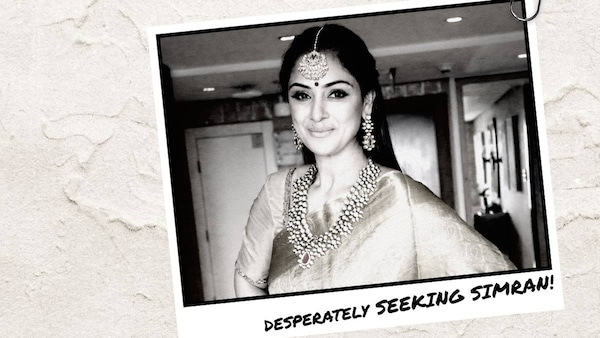
'(Post-Gulmohar) everyone has been asking me where I was for this long,' says Simran.
Last Updated: 04.00 PM, Mar 16, 2023
Gulmohar on Disney+ Hotstar has landed like a calm breeze to offset the sharp sun of early summer. If Sharmila Tagore’s Kusum is all things grace, Indu, the other important lady in the Batra household, is played by the effervescent Simran, who seems to have finally got the pan-India recognition that ought to have come her way a long time ago.
Be it the look on her face when there’s a request for more tea, her steadfast love for her husband Arun (the achingly lovely Manoj Bajpayee), her ability to hold him together when their life crumbles, her warm bond with her mother-in-law and househelp Reshma, Simran as Indu is a breath of fresh air in a home that does not know what’s going to happen to it.
She’s walking around constantly, picking up things, instructing others to do something, ensuring her world is in order. The inspiration for this busy look, Simran says, came from Kannathil Muthamittal’s Indra. The director Rahul Chittella had apparently requested her to travel back to that character before listening to the narration.
Simran’s fans from the South, where she ruled for more than a decade and has been working since 1997, did not take very kindly to social media questions as to whether the actress who played Indu was the Tere Mere Sapne girl. A news daily even put out a tweet thread of her innumerable memorable performances. That’s the kind of steadfast fandom the actress, who now lives in Delhi with her husband and two teenage sons, has garnered over the decades.
In a laidback interview over the phone, Simran speaks of the joy from the feedback coming her way, how she’s crafted her career, her thoughts on being “recognised” in the North now, and her immense love for her fans from the South. Edited excerpts:
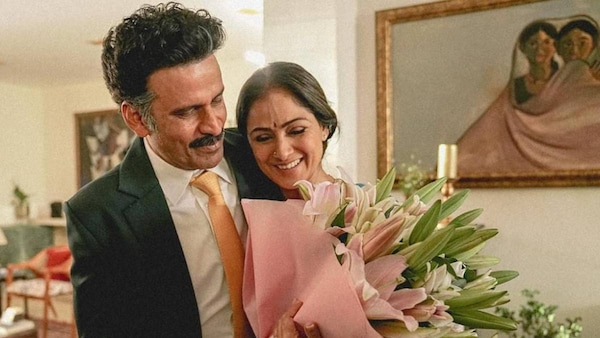
We now know everyone loves Indu. But how did Simran react to Indu?
With any character, it has to enter my heart first before I commit. Indu went right into my heart three years ago when I sat down for a narration with Rahul. He wanted Indu to be someone who is brisk and in control of things. When he finished the narration, I realised there was so much more to Indu. The story was so meaningful, and I saw what a vital part Indu played in the family.
Rahul mentioned Kannathil, and I saw why he said that. The way Indu and Indra hold the family together might be the same, but they are solving different issues. Indu has to set right a home that’s split right down the middle.
How did you prepare to play Indu?
Through my regular process of trying to be a character. Indu is someone who gives strength to every person in her life. She has an experience of a lifetime behind her. By now, I have too. I’m 47 and have been through life to an extent. I relate better to some instances now. I thought of the many women who are at home supporting their family. We don’t call them working women, but how much they handle!
We have hardly portrayed the strength of a homemaker on screen. Indu is one such woman. She stands tall and loves all at home and does not manipulate. She has a different vibe with each that she holds on to. She feels sad sometimes, but moves on. I think age and my life’s journey have given me the gravitas to understand someone like Indu and play her better.
This different vibe you speak of… when Arun breaks down, Indu closes the door on her son. That’s a deeply private moment that involves just the couple…and it possibly says a louder ‘I love you’ than words might have.
That’s true. When a couple has been together for so long, they don’t really have to speak much. Showing is easier. That relationship has handled so much. After 30 years of togetherness, when a spouse is having a meltdown, when he’s at the weakest point of his life, any person entering the room, even the son, is a violation of his privacy.
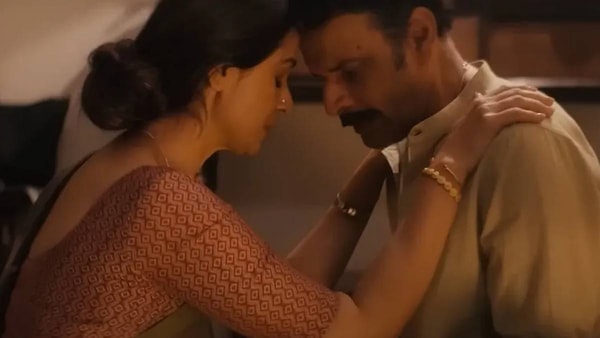
From a young age, you’ve played roles that called for a certain maturity. In that sense, how different was Indu?
I guess when you play certain roles in your real life, they spill over to the performance space too. There are some roles you research for. There are some roles that are a reflection of your own life. I am very fortunate that I got this opportunity. I’ve been very choosy about my work — it has to fit in with my personal life and schedule.
Even when I was at my peak, I was lucky to work with directors who wrote their women characters well. I’ve worked with solid filmmakers who made me work hard to fit into their vision of a character.
If I began with focusing on continuity and costumes, I soon got involved with the team from shooting to publicity to ensure the character reached the audience.
How do you usually choose a project?
Instinct. When you listen to a role, you can either see yourself in it or not. This team of Gulmohar was young and committed to the film. Some films work, and restore your faith in your method. Some films don’t do as well, and that’s acceptable too.
You’ve taken your children along with you during your career moves — Mumbai, Chennai and Delhi. How did you cope as a family?
I plan my work around their schedule. They travelled with me until recently. They have shifted schools and lived in three cities. I think this has given them a solid education on life. My elder one is now a proper teen with his own set of friends. The younger one still travels with me occasionally.
With Gulmohar, many of your fans think you’ve got your due. How do you see this?
It is very gratifying to see the reception. Yes, this is a big project. Sharmila Tagore is a huge name, Manoj Bajpayee has made his mark working very hard. But, he’s still a ‘Family Man’! This project gave me a sense of completeness. Everyone has been asking me where I was all this long. I have been more active in the South. I hope that the next time I work in Hindi, people won’t ask me the same question again. Yes, I feel bad when people ask where I’ve been without doing some basic research. But I look at this this way: in today’s world, thanks to OTT and people being open to seeing work in other languages, you don’t remain unknown or hidden for long. Recognition finds you.
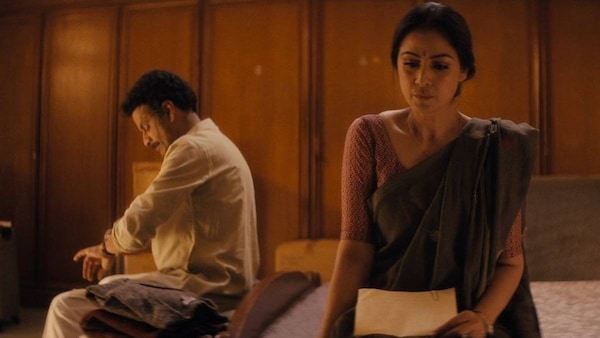
When I was working in the South, even our biggest hits were remade, not dubbed. The original performances got left behind. I’m so happy to see actors and films doing well across the country now, irrespective of language. Vijay Sethupathi and Samantha have a huge fan following across the board, RRR has everyone rooting for it, PS1, KGF and Kantara charmed so many people. Creativity will always find a way to come out.
Do you ever feel female actors your age need better-written roles?
Most certainly. I do feel I am not getting the roles needed to feed the performer in me. They should write better women characters. This is a male-dominated industry and they believe in catering to those who bring in the money. I don’t grudge them that. But don’t relegate the women to the background please. If there’s an actress on board, create an arc for her, create a world for her within the project’s universe. That said, I know you can’t force people to write. If they feel they should focus on [making] Rs 200 crore and not something that might bring in Rs 20 crore, that’s their choice to make.
Everyone’s been speaking about your styling in Gulmohar and your blouses. You’ve always been an elegant dresser, right?
Ha, yes. Indu is probably my age, and I wanted her to look the way I’d like to look. I wear cargos and saris and love both; I love dressing up. I did not want any high-neck blouses, and I told Rahul that I’ll come up with a look. I’m used to saris, and wear them for occasions and festivals. Plus, all those years of wearing a sari for the movies. I stuck to cotton saris and chose colour combinations. For example, if there are 10 shades of yellow to work with, you decide the one you want based on your parameters. We worked as a team to get Indu’s look right.
And no, I’ve not learnt fashion designing. But, I’ve picked up knowledge along the way, from the numerous film sets and the people I interact with. As a rule, over the years, I’ve always opted for comfort over everything else. If I am not comfortable wearing something, it will show on my face.
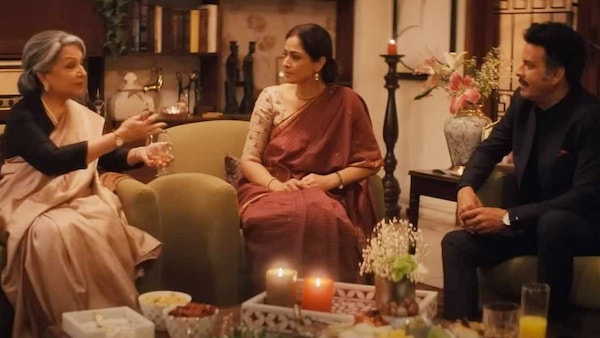
You still answer your phone yourself, you touch base before an interview to confirm the time. These are all remnants of a lovely past. Fame sits very lightly on you…
Well, I learnt early on in the job how not to let fame affect me. With popularity, there was the responsibility to carry yourself the right way in public. In my head, fame equals hard work. The love that you get, that’s for the work you put in. Letting that get to your head is not my cup of tea.
Yes, the attention can get difficult, there’s a lot of pressure, but you’ve to keep that pace no matter how many projects you’ve completed.
And, it’s easier when you’re yourself off screen and not a version of what people expect you to be. This is why I reach out to people the way I do in real life. I cannot hold up my nose and walk. Getting attention equals getting love, and you must respect that.
Of course when I am myself, I do get the ‘Oh my god, she’s Simran’ from some, but that passes.
Has the phone stopped ringing post Gulmohar?
Well, it’s been ringing more often. I am listening to some stories. I have completed two films in Tamil — Andhagan and Dhruva Natchathiram — and might be a part of one more. I’m listening to narrations in Hindi.
It’s a nice feeling when your work reaches people. That’s the best part, actually.
